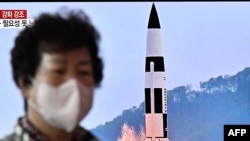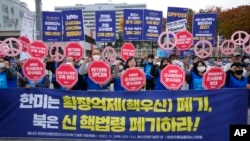In December 2019, then-U.S. President Donald Trump was asked whether he thought it was worth it to have “all those” U.S. troops stationed in South Korea.
“It could be debated. I could go either way,” Trump answered.
The comments came at the height of tense negotiations over Trump’s demand that Seoul pay much more to host approximately 28,000 U.S. troops.
Trump's answer did not come out of the blue. Throughout his time as president -- and in fact, even before and after his presidency -- Trump regularly questioned the value of the U.S.-South Korea alliance.
According to I Alone Can Fix It: Donald J. Trump's Catastrophic Final Year, a 2021 book by two Washington Post journalists, Trump privately told close aides that he planned to “blow up” the U.S.-South Korea alliance if he won reelection in 2020.
In part because he lost that election, no one knows how serious Trump was about upending the U.S. relationship with South Korea.
Some analysts say Trump was only being transactional, as he was with many other allies, and that he never intended to abandon Seoul.
Others are not so sure, noting Trump once went so far as to suggest South Korea should get its own nuclear weapons so that Seoul could protect itself.
Faced with an increasingly hostile and nuclear-armed neighbor, South Korea can afford little ambiguity on the matter, which helps explain why a growing number of prominent voices in Seoul would like to see if Trump’s nuke offer still stands.
Going mainstream
One of the most outspoken advocates of South Korea getting its own nuclear weapons is Cheong Seong-chang, a senior researcher at the Sejong Institute, a nonpartisan foreign policy research organization outside Seoul.
Cheong spoke to VOA several days after Trump announced his 2024 presidential bid. He said it is not just the possible return of Trump that is concerning -- it’s the chance that his America First ideas will have a lasting impact on U.S. foreign policy.
“The United States has a presidential election every four years…[it] may go back to isolationism, which is why South Korea’s own nuclear armament is essential to maintain stable security and deter North Korea,” Cheong told VOA.
Fringe figures have long called for South Korea to acquire nuclear weapons, but recently the proposal has gone mainstream. This year, several well-known scholars have proposed Seoul either acquire its own nuclear arsenal or request the redeployment of U.S. tactical nuclear weapons that were removed in the early 1990s.
A poll published in May by the conservative Asan Institute for Policy Studies suggested that more than 70% of South Koreans support their country developing indigenous nuclear weapons -- the highest level of support since the organization began asking the question in 2010.
Cheong is trying to turn that support into something more organized. In early November, he launched the ROK Forum for Nuclear Strategy, which promotes South Korea’s nuclear armament and discusses plans to make it happen. In its infancy, the group already has more than 40 members, according to Cheong.
Not just Trump
Trump is far from the only factor driving South Korea’s nuclear arms debate.
South Korean leaders are also alarmed at the rapid development of North Korea’s nuclear weapons. North Korea has conducted a record number of launches this year, including both long-range missiles that could reach the United States and shorter-range ones that threaten Seoul. U.S. and South Korean officials say North Korea could conduct another nuclear test soon.
North Korea has also embraced a more aggressive nuclear posture. In October, leader Kim Jong Un oversaw a series of launches simulating a tactical nuclear strike on South Korea. The North is likely moving ahead with deploying tactical nuclear weapons to frontline positions, analysts say.
In addition, Russia’s invasion of Ukraine has underscored the risks that non-nuclear states face when confronted with an aggressive, nuclear-armed neighbor.
Although South Korea is protected by the U.S. nuclear umbrella, some South Korean analysts believe the United States may be reluctant to respond to a North Korean attack if Pyongyang has the ability to destroy a major U.S. city -- in essence, the fear is that the United States would not want to risk San Francisco to save Seoul.
“North Korea believes there’s a slight chance that they could get away with a nuclear attack without getting a reprisal from the United States,” said Chun In-bum, a retired lieutenant general in the South Korean army.
Big obstacles
In Chun’s view, acquiring nuclear weapons is one way for South Korea to guarantee its security, although he acknowledges major barriers.
Among the uncertainties is the question of how China, Russia, and others in the region would respond. For instance, would Japan, another U.S. ally in Northeast Asia, feel compelled to get its own nuclear weapons?
Analysts are also unsure exactly how the United States would react if South Korea eventually did begin pursuing nuclear weapons. And many South Koreans who support acquiring nukes hint they would tread cautiously with that in mind.
“It’s not as if I’m going to risk the alliance in order to have South Korea get nuclear weapons. But what happens if the U.S. president says he’s going to pull U.S. troops from Korea? What if that becomes a reality?” asked Chun.
In some ways, the situation mirrors the 1970s, when South Korea briefly pursued a nuclear weapons program amid questions about the long-term U.S. security commitment.
Instead, South Korea ratified the Nuclear Nonproliferation Treaty. It is now uncertain what consequences South Korea would face for abandoning its commitments under the pact.
Reassurance limits
When asked about the issue in recent months, Pentagon and State Department officials have ruled out the idea of returning tactical nuclear weapons to South Korea. Instead, they have focused on how the U.S. is prepared to use the full range of its capabilities, including nuclear weapons, to defend South Korea.
At a meeting earlier this month with his U.S. counterpart, Lloyd Austin, South Korean Defense Minister Lee Jong-sup said Seoul is not considering the return of tactical nuclear weapons and remains committed to the denuclearization of the Korean Peninsula.
At that Pentagon meeting, both sides agreed to several measures meant to reinforce the U.S. security commitment. The steps included increasing the deployment of U.S. strategic assets, such as long-range bombers and aircraft carriers, to South Korea, and vowing that any North Korean nuclear strike “will result in the end of the Kim regime.”
What they didn’t discuss, at least according to the 10-page joint communique released following the meeting, was Trump or his America First ideas -- perhaps the one area where U.S. officials can offer the least reassurance.
“You can’t,” said Jenny Town, a Korea specialist at the Washington-based Stimson Center.
“Democracies are democracies and policies can shift,” she said.
Much depends on how Trump and his ideas fare in the 2024 elections. But even if Trump loses again, Town said, many in South Korea will have concerns about the future.
“It isn’t business as usual anymore,” she said. “It’s recent memory, and it doesn’t fade very quickly.”





